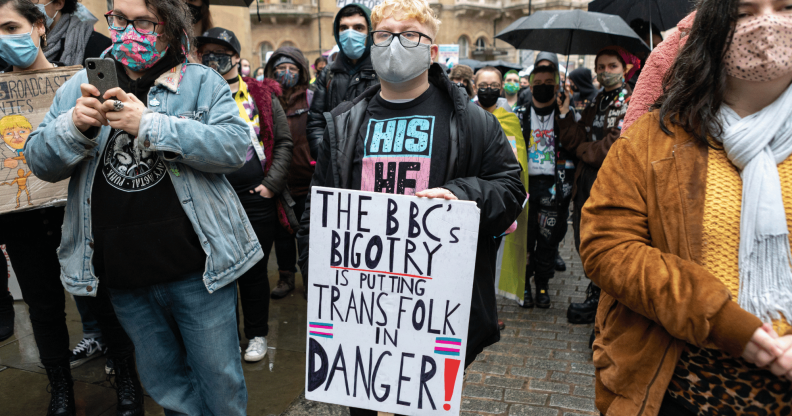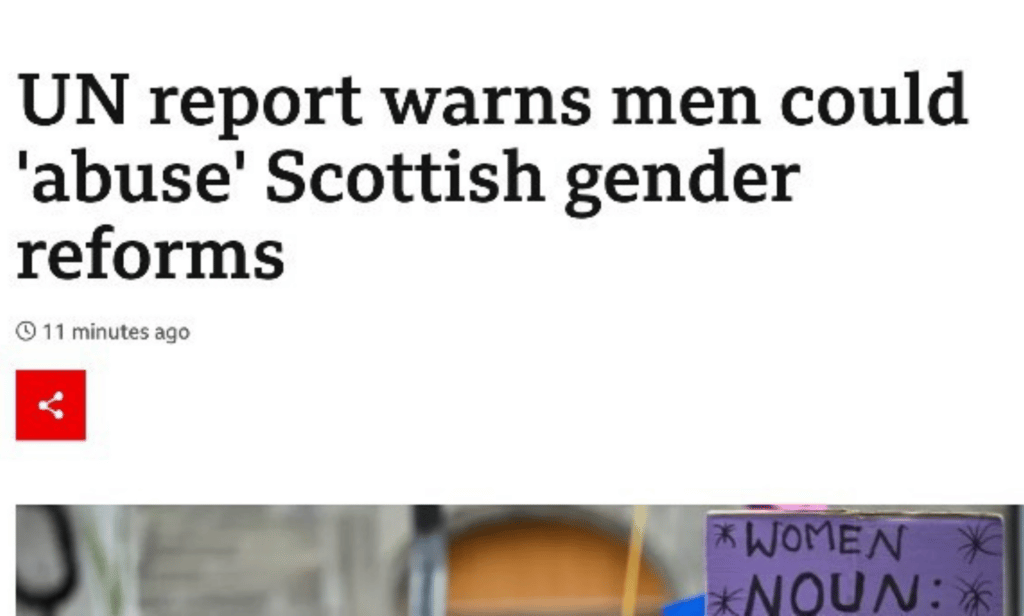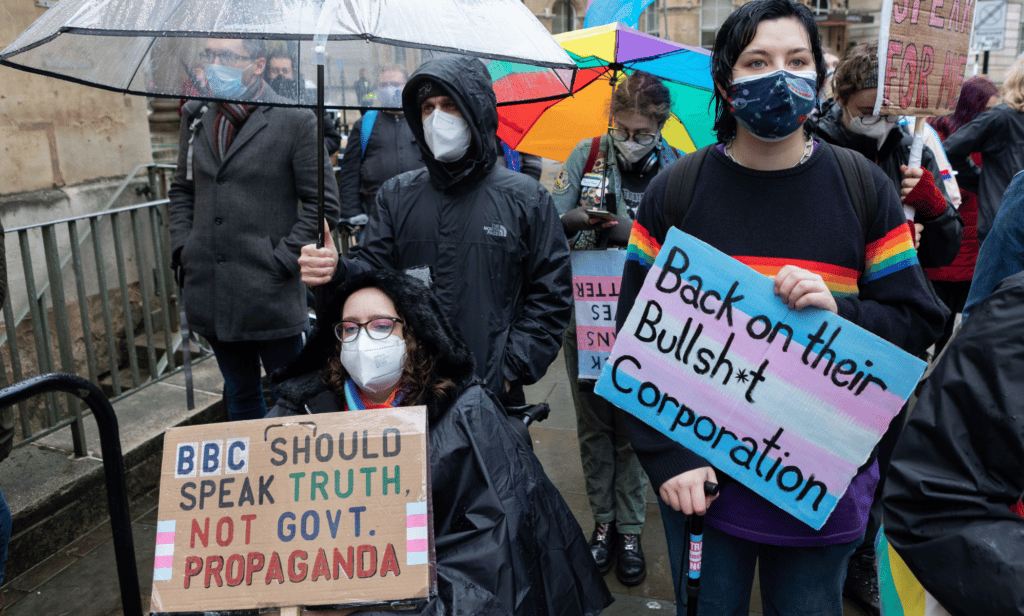BBC criticised for ‘misleading’ claim UN report had warned against trans rights reform

LGBTQ+ advocates and people online have condemned a “misleading” BBC article that initially framed an anti-trans letter on Scottish gender reform as a “report” from the UN. (Getty)
LGBTQ+ advocates and people online have condemned a "misleading" BBC article that initially framed an anti-trans letter on Scottish gender reform as a "report" from the UN. (Getty)
The BBC has been criticised for publishing a “misleading” article on Scottish gender reform that initially framed one anti-trans letter as a “report” from the United Nations (UN).
The article, which was published on Wednesday (23 November), initially ran with the headline: “UN report warns men could ‘abuse’ Scottish gender reforms”.
In actuality, the piece didn’t rely on a report but a letter to the UK government from a “special rapporteur”.
The headline was later changed to: “UN expert warns men could ‘abuse’ Scottish gender reforms.”
The letter was written by Reem Alsalem, United Nations Special Rapporteur on violence against women and girls.
The letter claimed reform to Scottish gender recognition law would “potentially open the door for violent males who identify as men to abuse the process of acquiring a gender certificate and the rights that are associated with it”.
This anti-trans argument, has been used to discourage long-needed reform to Scotland’s gender recognition process, has been described as “intrusive”.
The Gender Recognition Report (Scotland) bill, which passed its first Holyrood vote in October with overwhelming cross-party support, will streamline the process of how trans people can change their gender on legal documents.

The BBC published an article with a headline that claimed there was a “UN report” on the risks of Scottish gender recognition reform. The broadcaster eventually changed the headline to reflect this was based on the letter from an “expert” at the UN. (BBC)
The BBC eventually changed the headline of the article to reflect that it was a “UN expert” who made such anti-trans claims – not an actual report from the intergovernmental organisation.
The BBC ‘really needs to do better’
But activists and others on social media shared their collective anger that the broadcaster would publish another article attacking the trans community.
Sighing heavily, Jane Fae, chair of Trans Media Watch, told PinkNews: “With the BBC, it seems to be just one thing after another.”
“The bottom line here is that our supposed broadcaster of record appears incapable of reporting the news accurately,” fae said.
“It really needs to do better.”
Others described the article’s headline as “misleading” and said that calling the letter a report “exposes the BBC’s institutional bias on this issue (anti-GRA reform)”.
It isn't a UN report though is it?
It's a letter sent by someone expressing bigoted opinions that seem to completely misunderstand the UK's legal system.
There are no "right associated with" a female birth certificate and nor should there ever be – as per equality. https://t.co/b7Pxj4bqWy
— psychic contagion (@notCursedE) November 24, 2022
Unlike what the BBC has reported, it's not a 'UN report'. It's a letter sent by a Special Rapporteur. To call it a report is hugely misleading and exposes the BBC's institutional bias on this issue (anti-GRA reform) https://t.co/tVKLyaj0hH— Jeffrey Ingold (@Jefflez) November 24, 2022
False, it wasn’t a report it was an opinion letter from one official
Totally misleading headline yet again— Andrew Atter (Citizen Ally ) (@AndrewAtter) November 24, 2022
Framing a single letter as a “report” is intentionally misleading and falls beneath basic journalistic standards
— Goose Enthusiast (@CrucibleOfWords) November 24, 2022
A letter from someone who works for the UN isn’t a UN report
— Mazemind Tom (@bipbiplettuce1) November 24, 2022
There needs to be a report into the amount of transphobic material the BBC produces.
It’s becoming quite alarming now and isn’t by accident.— Loftino (@loftinopanevino) November 24, 2022
The one Tory policy I’d support is them defunding this bullshit.
— Fancy Brenda (they/them) (@SpillerOfTea) November 23, 2022
So bored of #BBCTransphobia
— TransSafetyNow (@DadTrans) November 24, 2022
This “UN Rapporteur” and by extension the BBC are transmitting a familiar anti-trans narrative which misrepresents UK law in claiming that a Gender Recognition Certificate is a passport to single sex spaces. It is not. The Equality Act does so under “gender reassignment”. pic.twitter.com/wT4Er80K6A
— The Slough House (@SlauHaus) November 24, 2022
https://twitter.com/DraxxYaruga/status/1595766539374002177
It's not a UN report, it's a letter from a random transphobe. But pop off BBC, way to double down even further on your bigotry. Cunts. https://t.co/BW6McDqfs7
— Flora🏳️⚧️💙💙trans joy💫🔆 (@QueerThassie) November 24, 2022
PinkNews has contacted the BBC for comment.
The UN rapporteur’s letter appeared to also misunderstand what the Gender Recognition Reform (Scotland) bill does.
The bill doesn’t grant anyone access to “single-sex and gender-based services”, which was a concern listed in the letter.
Instead, the legislation will allow trans people to self-identify without being required to get medical reports or a diagnosis from professionals. Additionally, applications for a gender recognition certificate – the legal recognition of their gender – would be handled by the registrar general for Scotland.
It would also cut the requirement that applicants need to have lived as their authentic gender down from two years to three months. It would also lower the minimum age that someone can apply from 18 to 16.
This is far from the first time that the BBC, which has been branded as “institutionally transphobic”, has been called out for wilfully misreporting on issues impacting the lives of trans people in the UK.

LGBTQ+ advocates and allies have widely condemned anti-trans articles published by the BBC. (Getty)
BBC News faced widespread outrage in October 2021 after it published a piece titled “We’re being pressured into sex by some trans women”, which focused on results from a survey of 80 people to claim that trans lesbians are pressuring cis lesbians into sex.
Thousands of people signed an open letter to the BBC to highlight how the article used a “deeply flawed study” to suggest trans women “pose a risk to cisgender women”.
There were also protests outside of various BBC headquarters, protesting the broadcaster’s history of anti-trans behaviour, and there was a mass resignation of LGBTQ+ staff in the wake of the article.
The BBC has continuously insisted the anti-trans article was impartial and subject to a “rigorous editorial process”. However, the company’s complaints team found it fell below the broadcaster’s editorial standards.

